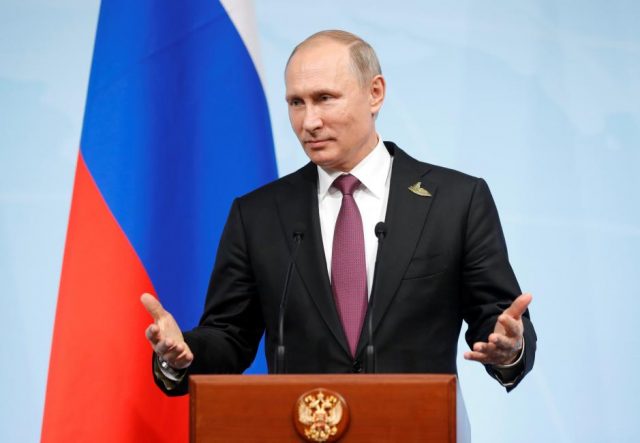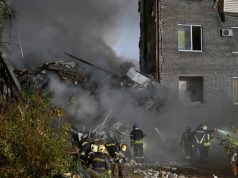
MOSCOW/BRUSSELS — Russia warned it was edging closer to retaliation against Washington after the House of Representatives backed new U.S. sanctions on Moscow, while the European Union said the move might affect its energy security and it stood ready to act too.
The lower house of the U.S. Congress overwhelmingly voted to impose new sanctions on Moscow on Tuesday and to force President Donald Trump to obtain lawmakers’ permission before easing any punitive measures on Russia.
“This is rather sad news from the point of view of Russia-U.S. ties,” said Dmitry Peskov, a Kremlin spokesman. “We are talking about an extremely unfriendly act.”
He said President Vladimir Putin would decide if and how Moscow would retaliate once the fresh sanctions became law, while Russia’s deputy foreign minister warned the move was taking bilateral relations into uncharted waters, killing off any hope of improving them in the near future.
The sanctions still need to be approved by the Senate and by President Donald Trump himself. Bob Corker, chairman of the U.S. Senate Foreign Relations Committee, said lawmakers are near an agreement that would pave the way for the Senate to vote on legislation imposing new sanctions on Russia and Iran.
Corker told reporters he expected an agreement would be announced as soon as Wednesday evening, which means that the Senate could pass the bill within days. However, he did not say whether the Senate version of the bill would strip out language imposing sanctions on North Korea, as he had suggested earlier in the day.
Trump, who has found his presidency embroiled in a distracting row over his associates’ alleged ties to Moscow and is on the defensive over accusations Moscow helped him win election last year, has said he wants to mend relations with Russia that are languishing at a post-Cold War low.
Trump denies any collusion between his campaign and Russia.
Most White House watchers believe Trump will reluctantly sign off on the new sanctions, given deep support for them among U.S. lawmakers, including fellow Republicans, and his desire to avoid being accused of being soft on Moscow.
The U.S. sanctions move has rattled Russia, which fears that its economy, weakened by a 2014 batch of Western sanctions imposed over its role in the Ukraine crisis, will now find it harder to recover and grow. Foreign investors could be scared off and the original sanctions would remain in place longer.
The European Union frets the new U.S. move could pose obstacles to its firms doing business with Russia and threaten the bloc’s energy supply lines.
The Kremlin, which flatly denies interfering in the 2016 U.S. presidential election to the benefit of Trump — a charge that helped propel the House action — says Washington is in the grip of what it calls anti-Russian hysteria.
Moscow has called the new sanctions “an extremely unfriendly step” that would hurt bilateral ties and international trade.
Peskov said Moscow would wait until the sanctions became law before fully analyzing them and deciding how to respond.
‘Uncharted territory’
Russian Deputy Foreign Minister Sergei Ryabkov told the Interfax news agency that relations were now entering “uncharted territory in a political and diplomatic sense.”
Moscow had initially hoped that Trump, who made upbeat statements about Putin before winning the White House, would work to repair the U.S.-Russia relationship.
But it has watched with frustration as the vote-meddling allegations have killed off hopes of any detente despite what it considered a positive first meeting between Trump and Putin at a G20 meeting in Germany this month.
The Foreign Ministry said this month that too many American spies were operating in Russia under diplomatic cover and that it might expel some to retaliate for the expulsion of 35 Russian diplomats last year by then-President Barack Obama’s administration.
Many Russian politicians increasingly believe Trump’s political foes and Congress have left the U.S. president with little room for maneuver on Russia and they have nothing to lose by retaliating.
European Union anger
In Brussels, European Commission President Jean-Claude Juncker said the EU was ready to act “within a matter of days” if it felt the new U.S. sanctions undermined the bloc’s energy security.
Brussels fears the new sanctions will damage European firms and oil and gas projects on which the EU is dependent.
“The U.S. bill could have unintended unilateral effects that impact the EU’s energy security interests,” Juncker said in a statement after a meeting of European Commissioners.
The Russia section of the bill includes a broad set of sanctions on a range of industries, and sets up a mechanism that would bar Trump, or any U.S. president, from easing any existing sanctions on Russia without Congress’ approval.
Several provisions target Russia’s energy industry, with new limits on investment by Americans and U.S. firms in Russian energy companies. U.S. companies would be barred from participating in energy exploration projects where Russian firms have a stake of 33 percent or higher.
The bill includes sanctions on foreign firms investing in or helping Russian energy exploration, although the president could waive those sanctions.
The bill would give the Trump administration the option of imposing sanctions on firms helping develop Russian export pipelines, such as the Nord Stream 2 pipeline carrying natural gas to Europe, in which German companies are involved.
In a concession to allies, those sanctions are optional, not mandatory.
The Commission said the U.S. House bill demonstrated that a number of EU concerns had been taken into account, but did envisage sanctions on any company, including European, that worked on Russian energy export pipelines.
That, it said, could affect maintenance and upgrades of pipelines in Russia feeding natural gas to Europe via Ukraine, or projects crucial to the EU’s energy diversification goals, such as the Baltic Liquefied Natural Gas project.
“The EU is fully committed to the Russia sanctions regime,” Juncker said.
The EU, the Commission also said, was raising its concerns via “all diplomatic channels.”








